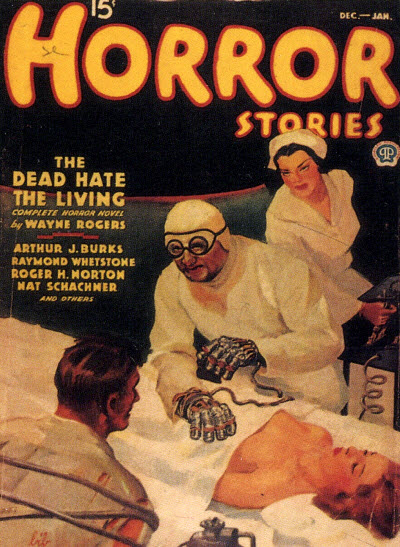
This is Horror Stories for December 1936-January 1937, cover by David Berger. The ISFDB entry for this issue is here. The version of the cover presented here is the one preserved at Galactic Central.


This is Horror Stories for December 1936-January 1937, cover by David Berger. The ISFDB entry for this issue is here. The version of the cover presented here is the one preserved at Galactic Central.
The greenish fluid in her syringe reminds me of Dr. Herbert West’s creation.
No original text or provenance, unfortunately.I started writing this post because I was pondering Dolly Gibson’s misadventures in Where Am I? and wondering about possible inspirations for a storyline in which a head is separated non-fatally from a body. Something did come up, and I hope it’s of interest, but I have to get there with a bit of a digression.
Now normally decapitation is a means of death, is indeed almost symbolic of death most inescapable. And death means the end: in Hamlet’s fictional universe it is the undiscover’d country from whose bourn no traveller returns. But in mad science, and therefore in the Gnosis universe, death has become something more of an exotic tourist destination, as Iris Brockman herself could tell you from lived (?) experience.
And that’s no coincidence. Dead matter turned living is a core topos of mad science. We can go all the way back to Ovid‘s Metamorphoses for the appropriate inspiration if we like.
Sanctius his animal mentisque capacius altae
deerat adhuc et quod dominari in cetera posset:
natus homo est, sive hunc divino semine fecit
ille opifex rerum, mundi melioris origo,
sive recens tellus seductaque nuper ab alto
aethere cognati retinebat semina caeli.
quam satus Iapeto, mixtam pluvialibus undis,
finxit in effigiem moderantum cuncta deorum,
pronaque cum spectent animalia cetera terram,
os homini sublime dedit caelumque videre
iussit et erectos ad sidera tollere vultus:
sic, modo quae fuerat rudis et sine imagine, tellus
induit ignotas hominum conversa figuras.
I’m not as good at Latin as I really ought to be, so I’ll rely on A.S. Kline‘s prose translation:
As yet there was no animal capable of higher thought that could be ruler of all the rest. Then Humankind was born. Either the creator god, source of a better world, seeded it from the divine, or the newborn earth just drawn from the highest heavens still contained fragments related to the skies, so that Prometheus, blending them with streams of rain, molded them into an image of the all-controlling gods. While other animals look downwards at the ground, he gave human beings an upturned aspect, commanding them to look towards the skies, and, upright, raise their face to the stars. So the earth, that had been, a moment ago, uncarved and imageless, changed and assumed the unknown shapes of human beings.
Prometheus takes dead matter and makes it living, in forms that resemble the very gods themselves.
And unsurprisingly, when Mary Shelley writes Frankenstein, (Project Gutenberg text here) the locus classicus of mad science, she will subtitle it The Modern Prometheus. Once-dead matter becomes living.
And then when H.P. Lovecraft choses to parody Frankenstein, he will create a story called “Herbert West–Reanimator,” (Wikisource text here), in which the mad science gets even madder, and in which of course a decapitation features prominently and then, of course…
…exploitation filmmakers get hold of the concept and push it still further, resulting in an extraordinary mad science movie.
Dead matter becomes living in an amazing way. And of course, there is a head in a dish on a desk.
But that’s not all. While Ovid is lofty mythology and Mary Shelley is high literature and even Lovecraft writing a story that seems full of his own neuroses (his story contains racist elements that really burn, I’ll have you know), kickass filmmaker Stuart Gordon is clearly going in his own direction here — a direction that brings the whole dead-matter-is-living and decapitation-is-not-the-end thing right into Dr. Faustus territory with what tireless reviewer El Santo identifies as “what could be the most disturbingly vile sexploitation-horror set-piece of its era.”
Yes. And it wouldn’t be EroticMadScience if we didn’t dwell on that a little, at least below the fold.